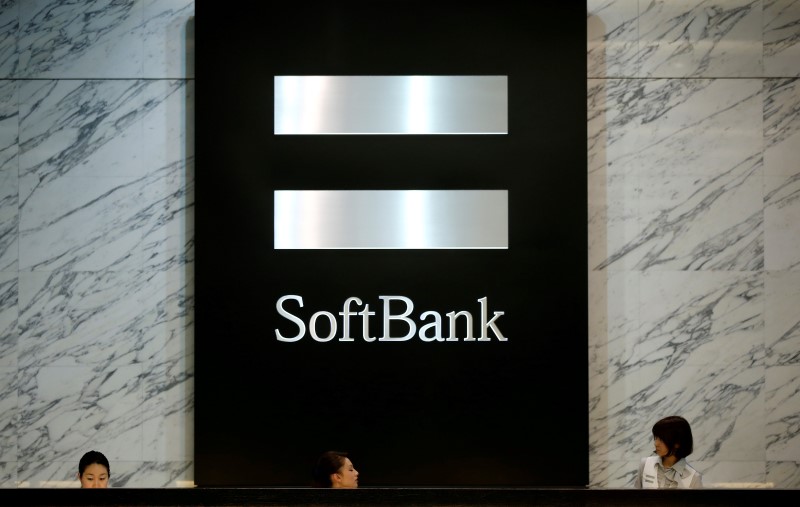By Geoffrey Smith
Investing.com -- Softbank (OTC:SFTBY) stock tumbles as reports of its heavy bets on U.S. tech stocks revive fears about its governance and strategy. Tesla (NASDAQ:TSLA) is spurned by S&P. Boris Johnson threatens to rip up the U.K.'s Withdrawal Agreement with the EU and put the two on course for a messy end to the Brexit transition period. Chinese exporters had a great month in August, and the ruble weakens as Germany threatens to stop the Nord Stream 2 gas pipeline for the first time. Here's what you need to know on Monday, September 7th.
1. Softbank shares tumble after 'Whale' reports
Softbank. (T:9984) shares tumbled 7.2% to their lowest in two months in the wake of a report suggesting that it had been a major player in the wild summer rally in U.S. tech stocks, using options to secure highly leveraged short-term returns.
While most of its trades still appear to be profitable at current levels, the report has revived unease about Softbank’s strategy and governance, threatening the stock’s robust performance since March. It has more than doubled since founder Masayashi Son moved to draw a line under poor investments in WeWork, Uber (NYSE:UBER) and others, and return cash to shareholders.
Having been exposed as the "Whale" that has moved the market, Softbank is now a bigger and easier target for others to bet against.
2. Brexit risk is back
Brexit risk is back on the radar after a report that the U.K. government is preparing new legislation that would make the continuation of smooth trade with the EU after the end of this year impossible.
The Financial Times said Prime Minister Boris Johnson’s new plans would revive the need for a hard border on the island of Ireland, scrapping the compromise embedded in last October’s Withdrawal Agreement. The Withdrawal Agreement allowed the U.K. to exit the EU on January without forfeiting any of its access rights to the EU market until the end of 2020.
The EU says that the principles underlying that agreement – including the U.K.’s acceptance of EU rules in a large part of the economy – are a precondition for any future deal on relations between the two. The pound fell 0.8% against the euro but U.K. stocks and bonds were firm.
3. Chinese stocks hit by SMIC report; Europe's gain on rotation hopes
With U.S. markets closed for the Labor Day holiday, the focus Monday was on Asia and Europe, which largely went their separate ways.
Chinese indexes fell by as much as 2.7% after reports suggesting that the U.S. is looking to impose sanctions on chipmaker Semiconductor Manufacturing International (HK:0981), further tightening restrictions on the Chinese high-technology industry.
That overshadowed numbers showing an extremely strong performance by China’s exporters in August. Exports rose 9.5% on the year, their biggest year-on-year gain since April 2019. Imports, however, fell 2.1% as the country’s refineries and traders dialed down oil purchases after filling their storage tanks at lower prices earlier in the summer.
The export data, and the broader narrative of growth and value stocks coming back to favor in the minds of investors as the tech rally unwinds, pushed European stock markets sharply higher. The Stoxx 600 rose 1.1%, despite the Brexit news and a weak German industrial production report.
4. Musk spurned by S&P
Tesla’s stunning rally this year wasn’t enough to persuade Standard & Poor’s to include it in its benchmark index, the S&P 500.
The committee that governs the index’s composition met on Friday and approved three other new entrants, but held off from the electric carmaker. As is usual, it didn’t explain its selection criteria. Analysts have speculated that the extreme volatility in the shares this year, coupled with the uncertain profitability of its underlying business, could deter S&P from including the stock.
Tesla stock fell 6.3% in after-hours trading on Friday after the announcement. It isn’t trading on Monday due to the Labor Day holiday.
The stock has still more than doubled since June, when speculation on it being included in the index really took off.
5. Germany threatens Nord Stream, and the ruble falls
The Russian ruble weakened and shares in engineering company Saipem fell to their lowest in a year as the furore over poisoned opposition politician Alexey Navalny led the German government to hint for the first time that it would consider abandoning the Nord Stream 2 gas pipeline project.
Foreign Minister Heiko Maas said in an interview at the weekend that he ‘hoped’ Germany wouldn’t be forced by the Navalny incident to impose sanctions on the project, which has heavy financial and political backing in Germany, but which is opposed by both the U.S. and many of Germany’s European allies.
Nord Stream 2 is set to carry gas directly from Russia to Germany under the Baltic Sea, something that gives Russia more political leverage over transit countries that have carried its gas exports to Europe for the last 40 years – notably Poland and Ukraine.
